Ella Baker
THE LIBRARY OF AFRICAN AMERICAN BIOGRAPHY
General Editor, John David Smith
Charles H. Stone Distinguished Professor of American History
University of North Carolina at Charlotte
The Library of African American Biography aims to provide concise, readable, and up-to-date lives of leading black figures in American history, in widely varying fields of accomplishment. The books are written by accomplished scholars and writers, and reflect the most recent historical research and critical interpretation. Illustrated with photographs, they are designed for general informed readers as well as for students.
Paul Robeson: A Life of Activism and Art , Lindsey R. Swindall (2013)
Ella Baker: Community Organizer of the Civil Rights Movement , J. Todd Moye (2013
Booker T. Washington: Black Leadership in the Age of Jim Crow , Raymond W. Smock (2010)
Walter White: The Dilemma of Black Identity in America , Thomas Dyja (2010)
Richard Wright: From Black Boy to World Citizen , Jennifer Jensen Wallach (2010)
Louis Armstrong: The Soundtrack of the American Experience , David Stricklin (2010)
Ella Baker
Community Organizer of the Civil Rights Movement
J. Todd Moye
Rowman & Littlefield Publishers, inc.
Lanham Boulder New York Toronto Plymouth, UK
Published by Rowman & Littlefield Publishers, Inc.
A wholly owned subsidiary of The Rowman & Littlefield Publishing Group, Inc.
4501 Forbes Boulevard, Suite 200, Lanham, Maryland 20706
www.rowman.com
10 Thornbury Road, Plymouth PL6 7PP, United Kingdom
Copyright 2013 by Rowman & Littlefield Publishers, Inc.
All rights reserved . No part of this book may be reproduced in any form or by any electronic or mechanical means, including information storage and retrieval systems, without written permission from the publisher, except by a reviewer who may quote passages in a review.
British Library Cataloguing in Publication Information Available
Library of Congress Cataloging-in-Publication Data
Moye, J. Todd.
Ella Baker : community organizer of the civil rights movement / J. Todd Moye.
pages cm. (The Library of African American Biography)
Includes bibliographical references and index.
ISBN 978-1-4422-1565-8 (cloth : alk. paper) ISBN 978-1-4422-1567-2 (ebook) 1. Baker, Ella, 1903-1986. 2. Civil rights workersUnited StatesBiography. 3. African American women civil rights workersBiography. I. Title.
E185.97.B214M69 2013
323.092dc23
[B]
2013018707
 The paper used in this publication meets the minimum requirements of American National Standard for Information SciencesPermanence of Paper for Printed Library Materials, ANSI/NISO Z39.48-1992.
The paper used in this publication meets the minimum requirements of American National Standard for Information SciencesPermanence of Paper for Printed Library Materials, ANSI/NISO Z39.48-1992.
Printed in the United States of America
For Murphy
As far as Im concerned, I was never working for an organization, I have always tried to work for a cause. And the cause is bigger than any organization, bigger than any group of people. It is the cause of humanity.
Even if segregation is gone, we will still need to be free; we will still have to see that everyone has a job. Even if we can all vote, but if people are still hungry, we will not be free.
Singing alone is not enough; we need schools and learning.
Remember, we are not fighting for the freedom of the Negro alone, but for the freedom of the human spirit, a larger freedom that encompasses all mankind.
Ella Baker, speaking to a mass civil rights meeting in Hattiesburg, Mississippi, January 21, 1964

Contents

List of Abbreviations
ACMHR: | Alabama Christian Movement for Human Rights |
CED: | Consumer Education Division |
CEP: | Citizenship Education Program |
COFO: | Council of Federated Organizations |
CORE: | Congress of Racial Equality |
FELD: | Fund for Educational and Legal Defense |
MIA: | Montgomery Improvement Association |
MFDP | Mississippi Freedom Democratic Party |
NAACP: | National Association for the Advancement of Colored People |
SCEF: | Southern Conference Educational Fund |
SCLC: | Southern Christian Leadership Conference |
SDS: | Students for a Democratic Society |
SNCC: | Student Nonviolent Coordinating Committee |
SPHR: | Special Project in Human Relations |
UCM: | United Christian Movement |
VEP: | Voter Education Project |
WEP: | Workers Education Project |
WPA: | Works Progress Administration |
YNCL: | Young Negroes Cooperative League |
YWCA: | Young Womens Christian Association |
Introduction

Strong People Dont Need Strong Leaders
In the middle decades of the twentieth century a mass movement of African Americans and a few white allies successfully challenged and transformed a system that oppressed them. In those years the overwhelming majority of American blacks lived in the southern states, where white supremacy was codified in Jim Crow law, ingrained in social custom, and policed with horrific levels of violence, on the part of both white citizens and representatives of state and local governments. Without economic might or significant voting power, and therefore without reliable allies in any of the three branches of the national government, black citizens worked without government protection or a realistic expectation of access to equal justice under the law. Yet they somehow leveraged the one power they did havepeople powerto transform their nation. Others have since followed their example to change the world.
The civil rights movement was the best, brightest, and most powerful display of democratic social change ever seen in the history of the United States of America. In retrospect, it seems almost impossible that a minority of Americans who were so thoroughly marginalized and exploited by the majority could, first of all, have had enough faith in American institutions that they literally risked their lives to reform those institutions not just for themselves, but for all Americans. That they could have succeeded was even more unlikely. But succeed they did, using no more or less than the collective power of ordinary people working in solidarity.
Arguing about who was most responsible for these successes is silly; the multiple black freedom struggles we know as the collective civil rights movement was a stew with hundreds of ingredients and thousands of cooks. Yet with the exception of a small handful of people that includes the movements most charismatic and effective spokesperson, Martin Luther King Jr., no one personno president or politician, religious leader or cultural figurecould claim more credit for the development of the mass movement or the changes it brought about than Ella Josephine Baker could have claimed had she had been so inclined. She was not so inclined; she came to believe that the worst thing that could happen to someone working for social change was to attract the attention of the mass media and begin playing for the cameras, so she refused to do it. But this reticence only begins to explain why Baker did not become the sort of national figure that other civil rights leaders became in her lifetime.

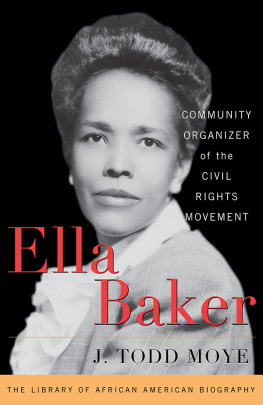


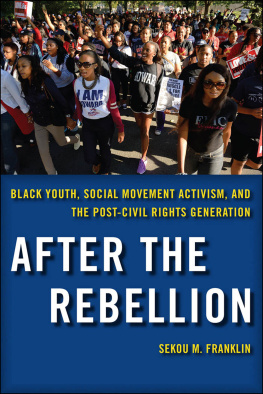
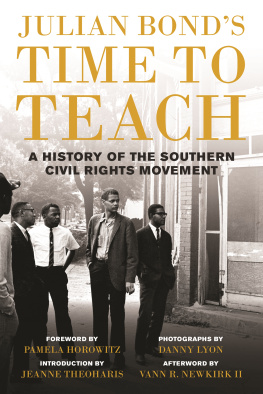
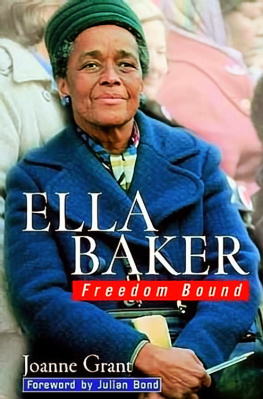
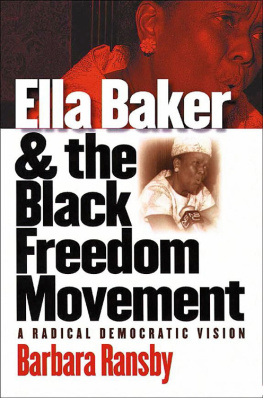
 The paper used in this publication meets the minimum requirements of American National Standard for Information SciencesPermanence of Paper for Printed Library Materials, ANSI/NISO Z39.48-1992.
The paper used in this publication meets the minimum requirements of American National Standard for Information SciencesPermanence of Paper for Printed Library Materials, ANSI/NISO Z39.48-1992.

